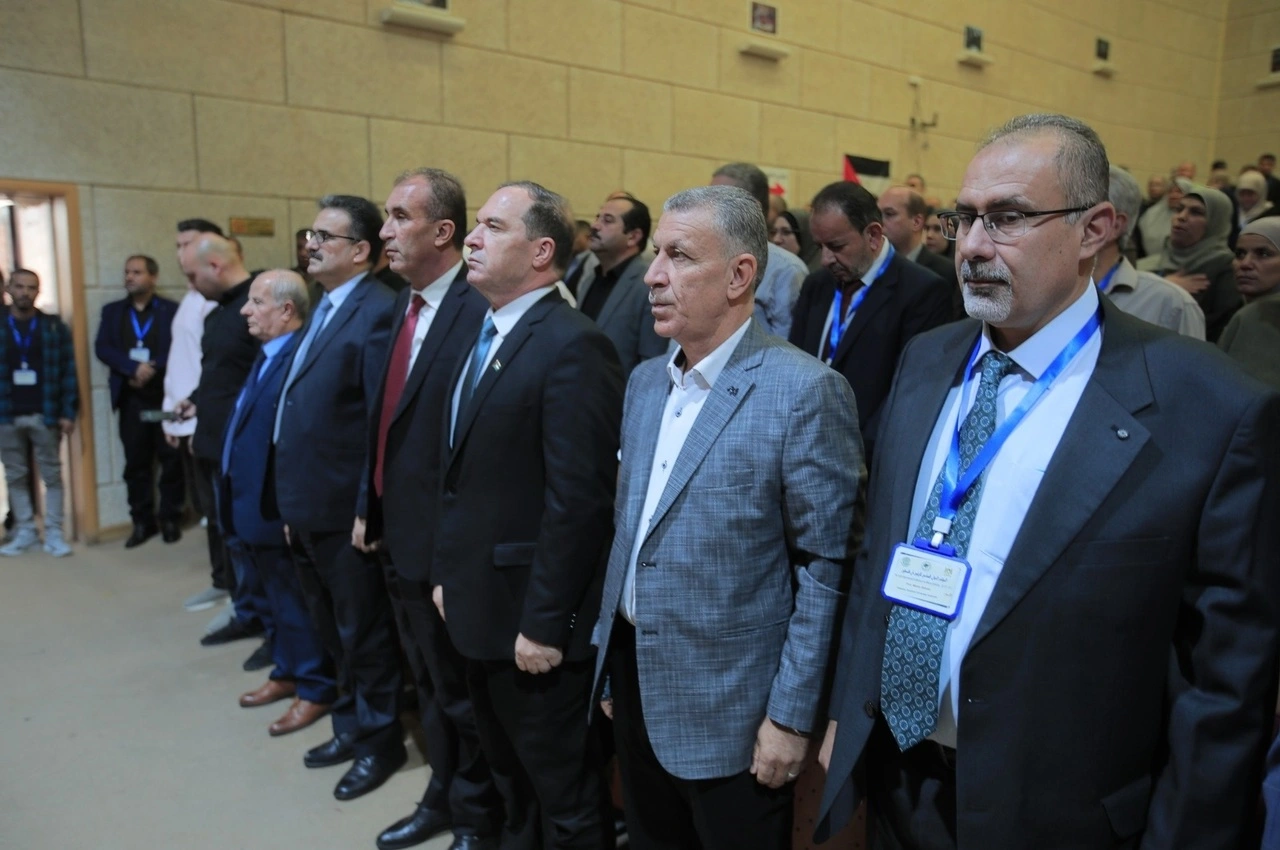


Palestine Technical University–Kadoorie PTUK organized the Sixth International Scientific Olive Conference at its main campus in Tulkarm, with broad participation from experts, researchers, and specialists. The event was attended by the University President, Tulkarm Governor Maj. Gen. Abdullah Kamil, Ministry of Agriculture Undersecretary Eng. Badr Al-Hawamdeh, Director General of the Wall and Settlement Resistance Commission Murad Ishtaywi, partner institutions, university staff, and students. The conference aligns with PTUK’s historical role in supporting the agricultural sector and advancing research that strengthens farmers’ resilience and national economic development.
The conference opened with remarks by Conference Chair Prof. Mazen Salman, who welcomed the audience and emphasized the central role of the olive sector in the national economy. He noted that the sector provides income for thousands of families, supports food industries, and forms a deep-rooted element of Palestinian identity. He highlighted rising challenges facing the olive sector, including climate change, rising costs, and marketing difficulties.
Prof. Salman stressed the importance of the conference as a scientific platform bringing together experts, farmers, and researchers to exchange knowledge and explore the latest methods in cultivation, pressing olives, and quality improvement. He called for developing drought- and pest-resistant varieties, improving water-use efficiency, and strengthening collaboration between academic institutions, government bodies, and farmers to build a comprehensive national vision for the sustainability of the olive sector. He concluded by thanking the organizing committees and supporting partners, noting that the conference outcomes will enhance the scientific and economic stature of the olive tree in Palestine.
University President Prof. Hussein Shanak welcomed participants and reaffirmed PTUK’s historic role since its founding in 1930 in serving Palestinian agriculture. He stated that the university remains a guardian of knowledge and land, and that the Sixth Olive Conference continues this legacy. He noted PTUK’s recent progress in international rankings and the achievements of its students in regional and global competitions, reflecting the clarity of the university’s vision and the strength of its research environment.
Prof. Shanak explained that the conference is taking place during exceptional national circumstances impacting the agricultural sector, particularly the olive tree. He reaffirmed the university’s commitment to linking research with real-world needs and producing practical, applicable outcomes. He also commended the parallel exhibition for embodying the partnership between knowledge and production.
Governor Maj. Gen. Dr. Kamil conveyed the greetings of President Mahmoud Abbas and emphasized the importance of the olive tree as a symbol of national identity, economic resilience, and peace—recalling Yasser Arafat’s famous statement at the UN carrying the “olive branch in one hand and the freedom fighter’s gun in the other.”
He described the olive tree as older than the occupation, highlighting the steadfastness of Palestinian farmers in the face of repeated attacks on trees and land. He stressed that the volume of scientific papers presented demonstrates the sector’s importance and praised PTUK’s commitment to agricultural development.
Director General Murad Ishtaywi outlined the growing challenges facing agricultural lands, including settler attacks, restricted access, and uprooting of trees— noting a sharp increase in severity and frequency this year. He stressed that the olive tree serves as a frontline defense in the struggle for land and identity.
Undersecretary Eng. Al-Hawamdeh reviewed the Ministry’s emergency support programs addressing farmer needs amid current conditions, including climate impacts and the destruction of agricultural lands. He presented the Ministry’s initiatives in food security, rapid response, greening Palestine, and rebuilding Gaza. He emphasized the importance of national projects and research partnerships with universities—especially PTUK—and encouraged researchers to develop practical solutions that enhance productivity and quality.
Following the formal remarks, the Sixth Olive Exhibition was inaugurated. Dozens of cooperatives, national companies, entrepreneurial projects, and olive nurseries showcased innovations in cultivation, milling technologies, quality control, production inputs, and rural products tied to olive oil. The exhibition provided a unique space for participants to explore locally produced goods and connect scientific knowledge with practical application, strengthening the Palestinian cooperative sector.
Alongside the exhibition and outreach activities, the first day of scientific sessions commenced.
The first session, chaired by Prof. Nawaf Abu Khalaf, included presentations by:
• Mehmet Ulas, on the impact of LED light spectra on olive seedling growth;
• Dr. Mohammad Jawabra, on farmers’ agricultural information sources and engagement in extension programs in Immatin village;
• Fayyad Fayyad and Odey Hussein, on the effects of Israeli occupation on the olive sector and climate-resilience strategies;
• Ramez Obaid, discussing the challenges facing olive presses;
• Taghreed Shahadeh from the Palestine Standards Institution, presenting on the Institution’s role in the sector.
The second session, chaired by Prof. Raed Al-Koni, explored advanced trends in olive pest management. A research team led by Francesco Porcelli and Mohammad Al-Qurna evaluated the effectiveness of mass traps for olive fruit fly control. Odey Hussein presented findings on plant-induced volatile compounds and their influence on above-canopy biodiversity. Ahmed Al-Omari discussed genetic diversity among Palestinian olive trees, followed by Ahmed Al-Ashqar’s analysis of alternate bearing and its impact on productivity. The session concluded with an expert discussion on applying these findings within Palestinian agriculture.
The first day of the Sixth International Olive Conference concluded with rich scientific discussions and a vibrant exhibition, reaffirming the commitment of PTUK and its partners to advancing the resilience of farmers and developing this strategic national sector.